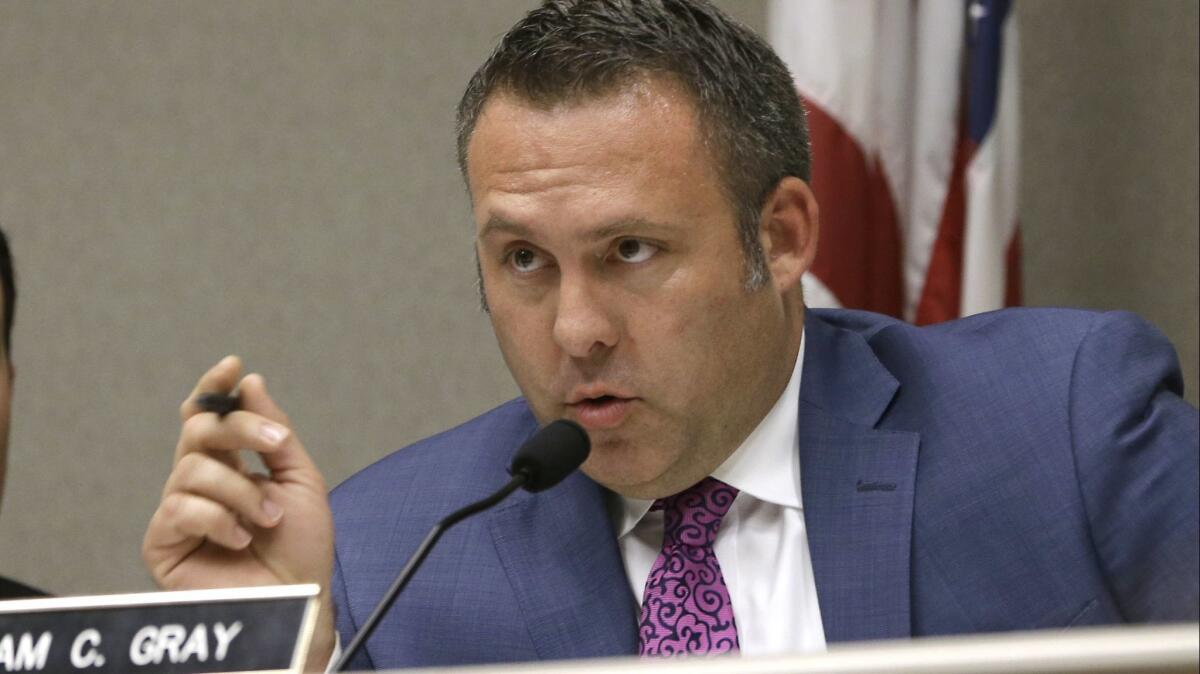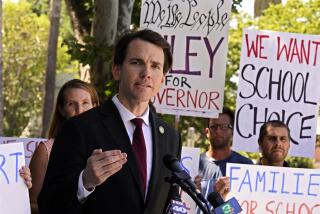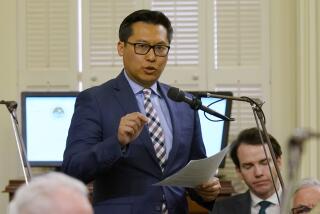Californians appointed to state posts could soon be barred from writing checks to lawmakers who vote on their nomination

A few months before the state Senate confirmed Lucy Dunn’s reappointment to the California Transportation Commission in 2013, she made a political contribution to the president pro tem of the state Senate, whose support was crucial to her staying on the panel.
Last year, Dunn, the president and CEO of the Orange County Business Council, was confirmed for a third term on the influential transportation panel. Three months later she contributed to a political campaign for the current Senate leader, Kevin De León.
Dunn’s contributions are allowed by state law, but some believe such payments undermine public confidence in the appointment process. That concern is behind a new proposal by Assemblyman Adam Gray (D-Merced) to outlaw contributions to senators by political appointees for up to a year between the time they are chosen by the governor until their required confirmation by the Senate.
“The state Legislature should safeguard the public’s confidence in our government institutions,” said Gray, chairman of the Assembly Committee on Governmental Organization.
“We have adopted a number of limitations and transparency measures in other areas, but the contribution activities of political appointees — who have a personal financial interest at stake — to state senators during the confirmation process remains almost entirely opaque,” Gray added.
The legislator said he came up with the bill after becoming concerned about reports from Washington that presidential appointees have given large sums of campaign contributions to senators involved in their confirmation.
“Anti-corruption measures like these maintain the public’s trust in our democracy,” said Jack Blattner of government watchdog group California Common Cause, adding the proposed restrictions would “[ensure] that conflicts of interest do not arise through the appointment process.”
Campaign donors have long received political appointments at the state Capitol.
Banker Mark Ferron and attorney Wylie Aitken each contributed the maximum $25,900 to Gov. Jerry Brown’s election in 2010 before he gave them coveted appointments to the state Public Utilities Commission and California Arts Council, respectively. Mary Nichols, an environmental activist, contributed $5,000 to Brown’s campaign before he re-appointed her as chairwoman of the state Air Resources Board.
Nichols later contributed thousands of dollars to candidates for the state Senate — including $1,000 to former Agoura Hills Sen. Fran Pavley’s re-election campaign — before the vote on her confirmation.
Dunn contributed $1,000 to Gov. Arnold Schwarzenegger’s campaign before he first appointed her to the Transportation Commission in 2008, and she gave to Brown’s campaign before he twice reappointed her to the panel.
Gray’s proposal does not regulate contributions to the governor, focusing instead on donations to senators involved in the confirmation process.
The prohibition would also apply to a contribution or gift to a candidate for the Senate if that person’s term would begin within 365 days of the appointment. It would include in the ban fundraising events held in the home of an appointee.
The measure does not apply to appointments made by Assembly and Senate leaders, most of which are to panels that don’t pay more than a stipend. But an aide to Gray said the intent is to eventually apply the measure to any appointment requiring Senate confirmation.
Dunn contributed $2,500 to former Senate leader Darrell Steinberg’s campaign committees, including $500 in September 2012 to his campaign for lieutenant governor, which was later abandoned.
The last contribution was made after Brown reappointed her, but less than four months before Steinberg, then chairman of the Senate Rules Committee, recommended that her reappointment be confirmed. The full Senate later voted unanimously to confirm her.
The commission, for which Dunn has served as chairman, decides how the state spends billions of dollars annually on transportation projects in California.
Dunn declined to comment. Steinberg, who is now the mayor of Sacramento, said Dunn was “infinitely qualified” for her appointment, and he was not influenced by political contributions when making decisions on confirmations.
Still, he supports Gray’s bill.
“Political contributions have no bearing on the Senate’s confirmation process,” Steinberg said. “That said, I think the Gray bill is a good idea because it gets at reducing even the appearance of impropriety. Establishing and maintaining the public’s trust in the integrity of government and elected officials is paramount to successful governing — and appearances matter.”
Twitter: @mcgreevy99
More to Read
Get the L.A. Times Politics newsletter
Deeply reported insights into legislation, politics and policy from Sacramento, Washington and beyond. In your inbox three times per week.
You may occasionally receive promotional content from the Los Angeles Times.







